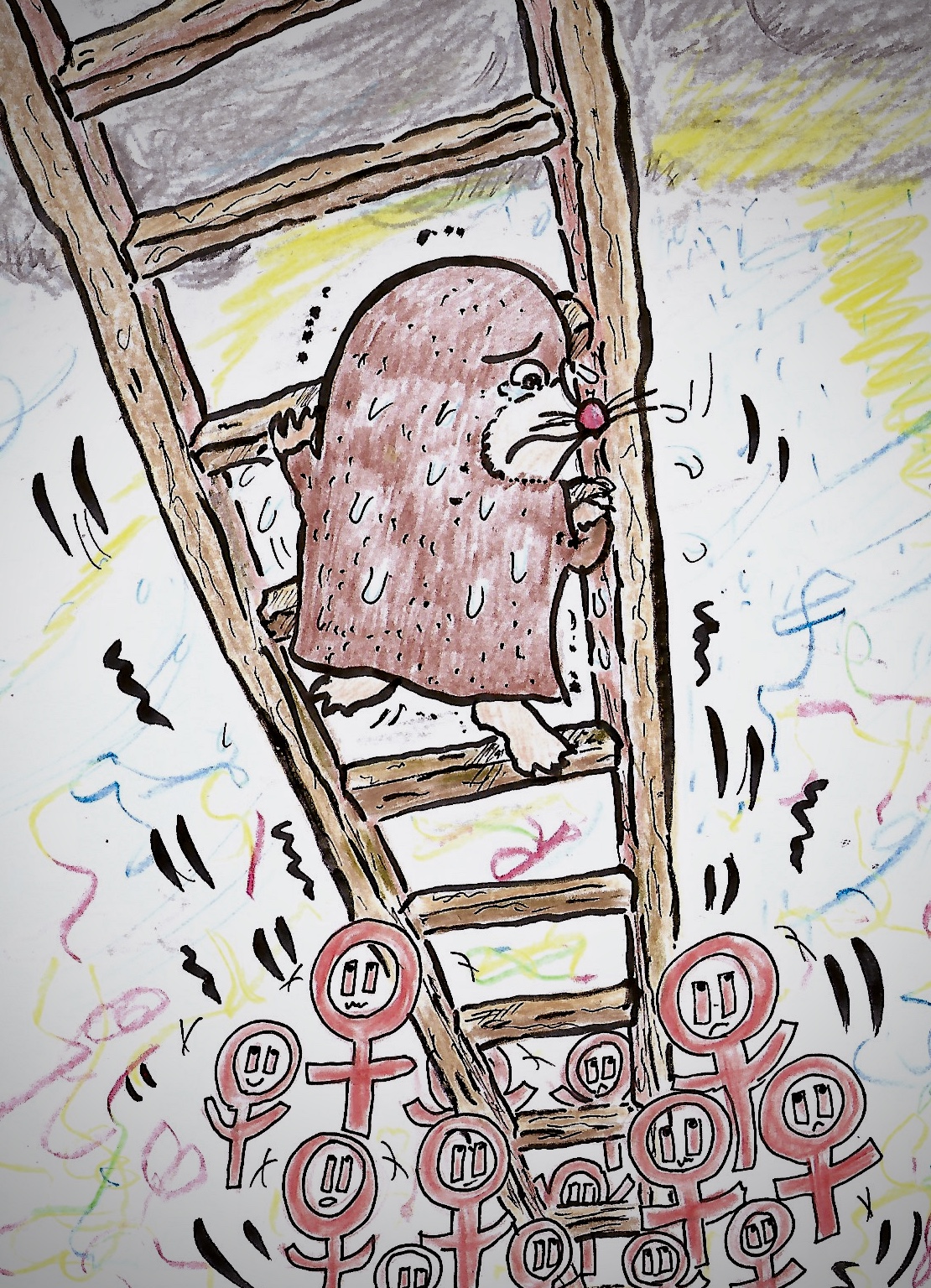
HABALOOK BLOG ハバルックブログ
Fifth issue: M.M.M.mmm mena…⏸️
Monday 14th August 2023
The origin of a word reflects our attitudes
~ Is Menopause the end or start of a chapter in your life?
Since recovering from the roller coaster ride of learning last week , I am now writing about another rough ride – Menopause! This is No. 2 of my sabbatical missions, The social history of menopause in Japan.
When I was much younger, I never imagined I would bang on about menopause in public… It was in the same category as menstruation in that it shouldn’t be talked about openly. It was always a TABOO(boo-!) from olden times to the present day and remains as one of the big stigmas for women. Society now treats menstruation better than with the days of “‘red’ days – these five-seven days when they shall not be allowed to enter kitchens or even participate in religious performances” (Stop Feeding the Wolf of Menstrual Taboos, Menstrupidea), far behind us, perhaps due to its association with the idea of an innocent girl being cursed by a bloody life circle.
Since it was established in 1984, World Menopause Day (18th October) has been celebrated by both the World Health Organization (WHO) and the International Menopause Society (IMS). Even with this relatively early recognition, it is only very recently that Menopause has been recognised as an issue that needs support at a societal and political level (as opposed to only medical) , with it taking until July 2023 (Yes! Now! TODAY!) for the first house of commons committee report, Menopause and the workplace report, to be published.
To be honest, if I was still in my 20s (and sometimes I delude myself into thinking I still am…), I wouldn’t be bothered by any reports or news about menopause. However, now that I am in the middle of this phase, I shouldn’t live through this troublesome period as a passive onlooker! Therefore, rather being an monstrous ignoramus, I started writing about menopause in my bilingual comic, “The Menopolitan”, two years ago… but the pressure of trying to complete so many tasks ran me into the ground and I reached burn-out, with menopausal symptoms creating only anxiety, not productivity…
Here I am! Two years since my first chapter was completed, I am still not sure what to write next…
Ok, ready, steady… write!
… PAUSE⏸️
Ok, first, back to the basics.
Let’s look at the word, ‘MENOPAUSE’.
The word, MENOPAUSE, originates from Ancient Greek, with Mēn meaning month and Pausis meaning pause. Interestingly, in Latin, Meno- referred to menstruation and Pausa, similar to Greek, meant pause. Menopause can be referred to by other phrases such as ‘CLIMACTERIC’. The word originates from the Greek word klimax meaning both ladder and step, and klimaktērikos, from the word klimaktēr meaning ‘critical period’. Generally, the word, MENOPAUSE, is used more commonly, but the word, CLIMACTERIC, while usually considered as interchangeable, actually refers (in medical contexts) to the general transformation of the ovarian function, including the premenopausal, menopausal and postmenopausal phases.
When you reach the climax, what will follow …?
In English, both MENOPAUSE and CLIMACTERIC have a kind of negative connotation which elicits an uneasy, neurotic or, in most cases, unbalanced attitude towards the concept. In the case of climacteric, its relation to the word climax is clear, and it brings forward a strong feeling that it’s all downhill from here – the most important parts of your life are behind you, and you’re now just waiting for things to get worse and worse until you eventually just die. Arguably, menopause is even worse. Whereas at least the decline in the word CLIMACTERIC seems natural, the word menopause almost literally invokes the idea of something defective or broken , calling the process a pause, implying that, if all is working as it should, the menstrual cycle should resume at some point.
On the other hand, in Japanese (and Chinese), the word is called ‘更年期’(Japanese: Kōnenki, Mandarin: gēng nián qī, Cantonese: gang nin kei ). The kanji, 更 ‘Aratamaru’ is a verb indicating renewal, with 年 meaning year/age and 期’ being a period/or term. When taken together, they present a definition which describes the process as a form of renewal that brings forward a new version of yourself!
Might the language and connotations of these characters suggest that Asian women suffer less stigma from society surrounding menopause? Because words reflect society and the attitude towards this period of life, does Asia have a more positive perspective on this than the West?
I am astonished by how little menopause and menstruation are supported in this modern era. And by just looking at the words, the implicit attitude found in the language gives me enough anxiety or relief.
I hope my menopausal period will be, ‘ Reaching the peak and Rebirth the new me!’
2023年 第5回目 8月14日(月)
メメメメメメメメメナ ポーズ⏸️
言葉は社会を反映する?
先週の学びのローラーコースターの乗り物酔いから立ち直ったので!今回は「更年期」という、もうひとつの試練を伴う乗り物?について書きます!このテーマは初めのブログで宣言した通り、私の研究課題No2ー日本社会における更年期の歴史でもあります。
私が随分若かった頃、更年期について、みんなの前でうだうだ話するなんて想像すらできなかったのが正直なところでして…だって更年期は月経と同じく、あまり堂々と話題にされるものではなく、どちらかと言えば昔から常に、タブー(ぶー!)。女性であるが故に課される、負の烙印のひとつ。昔は月経期間は「赤の週間」と呼ばれ、「その期間5〜7日間は台所に立ち入り禁止、宗教関連の儀式の参加禁止」(Stop Feeding the Wolf of Menstrual Taboos 狼達に月経タブーを吹き込むな, Menstrupidea) とされていた所もあったそうで、今まで無垢な少女が生理という呪いをかけられ、血で汚されるという発想から来たものだと思います。まあ、そんな頃に比べれば(但し少なくとも女性が社会的に認められている社会に限る)月経に対する社会の態度は向上したと言えるでしょう。
1984年に世界保健機関(WHO) と国際閉経学会(IMS)は世界更年期の日を制定。毎年10月18日を挟んだその週は、世界的に更年期に対する意識を高める取り組みが行われています。80年代前半にこの様な取り組みが既に始まったものの、更年期の問題は、ただ単に医療的な問題としてだけではなく、社会全体的な問題として政治で取り上げられたのは、ほんの最近で、なんとこの2023年7月(そうです!まさに今!)初めて「更年期における職場での就労状況」が英国国会で議論されその報告書が一般公開されました。
正直言って初めに述べた様に、もし自分がまだ20代だったら(時々自分はまだ20代だと大きな勘違いをすることも多くありますが…)更年期に関するニュースなんかを耳にしても、そんなに興味を持つことはないでしょう。でも今更年期のど真ん中にいる者として、この厄介な時期を消極的な傍観者として過ごすべきではない!と思い、うるさいだけの怪獣おばちゃんになって愚痴だけを垂れ流すのではなく、この経験をバイリンガルの漫画形式で書きとめようと2年前に「ザ、メノポリタン」を描き始めました。
が、しかし、、日々の細々とした仕事や雑事をこなすプレッシャーだけでクタクタになり、そこに生産性より不安を産み出す更年期ときたもんだ…
気がつけば第1章を描いてから、既に2年も経ってしまった!ガーン!その上何から描き出せば良いんだか、よくわからない…
よし、描くぞ!と筆をとったものの…
即、ポーズ⏸️
というわけで、基本に戻りまして、
更年期という言葉に焦点を当ててみました。
まず、英語では MENOPAUSEといい、古代ギリシャ語の「月」にあたるMēn と一旦停止ポーズにあたるPausis の組み合わせからできています。ラテン語ではMeno-は月経も意味し、Pausa,はギリシャ語と同じくポーズを意味します。MENOPAUSEという表現とは別に‘CLIMACTERICという表現も使われます。この語源はギリシャ語ではしご、階段の段を意味する klimaktērikos 。そこから派生したklimaktērとは「危機的な時期」を意味します。一般的に更年期にはMENOPAUSEが使われますが、このCLIMACTERICという言葉は閉経前、閉経期、閉経後を含む卵巣機能の全般的な変化を指す、全体的な転換期を表現します。
CLIMACTERICは climaxと同じ語源でまさにクライマックス=頂点であるのです。では頂点に達したらその後はどうなる?
英語ではMENOPAUSE も CLIMACTERICも共に不安が多く、神経質で、バランスが崩れた精神状態を示唆する否定的なイメージ。特にCLIMACTERICは、頂点クライマックスという言葉が示す様に、人生の頂点に到達したら後の人生はは転がり落ちるだけだぞ、頂点に登りつめるまでの人生は大切なものだったがその後は急下降。後は終わり、つまり、「死」だけが待っているんだと強く暗示している様…
ではMENOPAUSEという言葉はどうでしょうか。こちらはさらにタチが悪く、CLIMACTERICはどちらかと言えば自然の成り行き?的な感じがあるのに対して、MENOPAUSEはほぼ文字通り、何か欠陥がある、あるいは壊れていると言う意味を持ち、人生は一時停止しているが、すべてが正常に機能すれば、いつかは正常な月経周期が再開するはずだと暗示するものの、正常な月経周期が再開しないのが現実で、二度と正常には機能しない… 現実を突きつけられ呆然とした女性達は最高潮の感覚を迎えることもなく、ただ単に叶わぬ夢の狂気に精神をすり減らす…
さて、では日本語ではどうでしょうか。日本語の更年期は中国語でも同じ漢字で表記され(北京語gēng nián qī,広東語 gang nin kei )、 漢字「更」は訓読みで「あらたまる」つまり物事が新しく再生する「年」は年/年齢、「期」は時期/期間を意味します。つまり更年期は再生する時期で、新しい自分になると言った意味を示しているのです。
言葉から見ると、アジアは西洋に比べてずっと前向きです。その様な前向きな表現が使われると言うことは、アジアの女性は更年期を取り巻く社会からの負の烙印に苦しむことが少ないと言えるんでしょうか?一般的に、言葉には社会が反映されます。従って、アジアでは人生のこの時期に対する社会的見解が欧米よりもずっと肯定的なものと言えるのでしょうか?
でも、世界中を見回しても社会における更年期や月経のサポートはまだまだ不十分であるのが現実と言えましょう。更年期は、女性としての機能が永遠に変化する不安とその変化がもたらす未知の世界への旅立ちの不安とが混ざりあった、複雑か重要な転換期なのです。
私の更年期は「絶頂に達し、新しい自分に生まれ変わる!」前向きなものになります様に!
